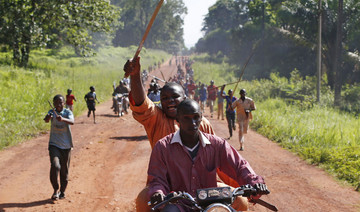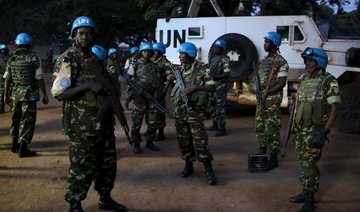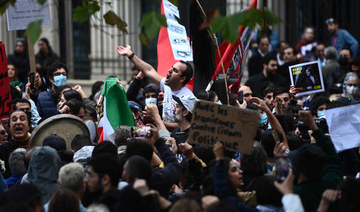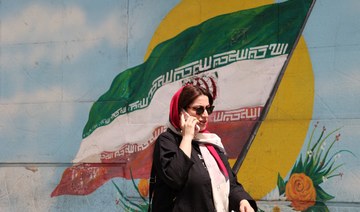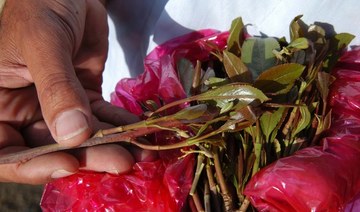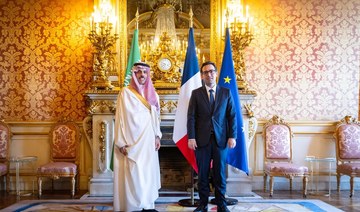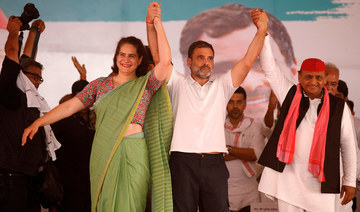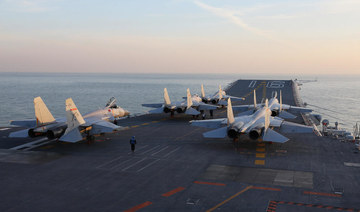JOHANNESBURG: A peace deal has been reached between the Central African Republic government and 14 armed groups after their first-ever direct dialogue aimed at ending years of conflict, the United Nations and African Union announced on Saturday.
Details of the deal were not immediately available. Talks began Jan. 24 in Sudan’s capital, Khartoum. “I am determined to work with the president and his government to address the concerns of our brothers who took up arms,” said cabinet director Firmin Ngrebada, according to the UN
The agreement represents rare hope for the impoverished, landlocked nation where interreligious and intercommunal fighting has continued since 2013. Thousands of people have been killed and hundreds of thousands displaced in a conflict that has sent at least two people to the International Criminal Court.
“This is a great day for Central African Republic and all its people,” said the AU commissioner for peace and security, Smail Chergui.
The fighting in Central African Republic has carried the high risk of genocide, the UN has warned. The conflict began in 2013 when predominantly Muslim Seleka rebels seized power in the capital, Bangui. Mostly Christian anti-Balaka militias fought back. Scores of mosques were burned. Priests and other religious leaders were killed. Many Muslims fled the country after mobs early in the conflict decapitated and dismembered some in the streets.
The vicious fighting in a country known more for coups than interreligious violence was so alarming that Pope Francis made a bold visit in 2015, removing his shoes and bowing his head at the Central Mosque in the last remaining Muslim neighborhood of the capital, Bangui.
“Together we say ‘no’ to hatred,” the pope said.
The violence never disappeared, intensifying and spreading last year after a period of relative peace as armed groups battled over lands rich in gold, diamonds and uranium.
After more than 40 people were killed in a rebel attack on a displaced persons camp in November, both the leader of the 13,000-strong UN peacekeeping mission and the country’s prime minister both acknowledged shortcomings in the response. “I knew that we did not have all the necessary means to protect our people,” the prime minister said.
In a grim report last year marking five years of the conflict, the UN children’s agency said fighters often target civilians rather than each other, attacking health facilities and schools, mosques and churches and camps for displaced people. At least half of the more than 640,000 people displaced are children, it said, and thousands are thought to have joined the armed groups, often under pressure.
Last month the chief of Central African Republic’s soccer federation appeared at the International Criminal Court for the first time since he was arrested last year in France on charges of crimes against humanity and war crimes. Patrice-Edouard Ngaissona is accused of leading the anti-Balaka for at least a year early in the fighting.
In November a Central African Republic militia leader and lawmaker, Alfred Yekatom, made his first ICC appearance, accused of crimes including murder, torture and using child soldiers. He allegedly commanded some 3,000 fighters in a predominantly Christian militia in and around the capital early in the fighting. He was arrested last year after firing gunshots in parliament.
So far, no Seleka fighters have been publicly targeted by the court’s chief prosecutor, Fatou Bensouda.
As the peace talks began last month, the Norwegian Refugee Council warned of “catastrophe” if no agreement was reached, saying repeated cycles of violence in one of the world’s poorest nations had “pushed people(asterisk)s resistance to breaking point.”
A majority of Central African Republic’s 2.9 million people urgently need humanitarian support, the group said.
On Thursday, the UN Security Council voted unanimously to extend an arms embargo on Central African Republic for a year but raised the possibility that it could be lifted earlier as the government has long urged.
Central African Republic, 14 armed groups reach peace deal in Khartoum
Central African Republic, 14 armed groups reach peace deal in Khartoum
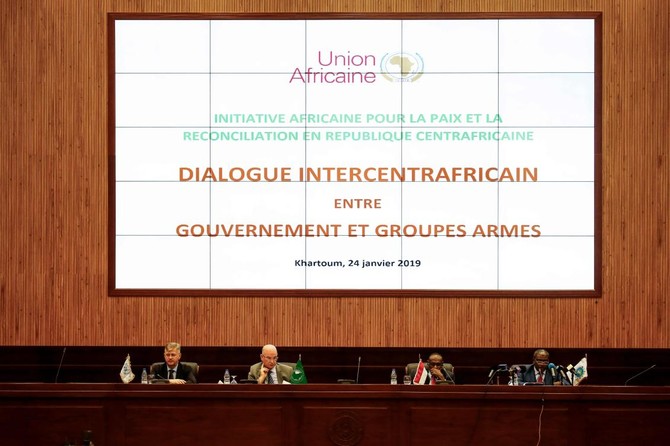
Supporters, opponents of Tehran clash in London
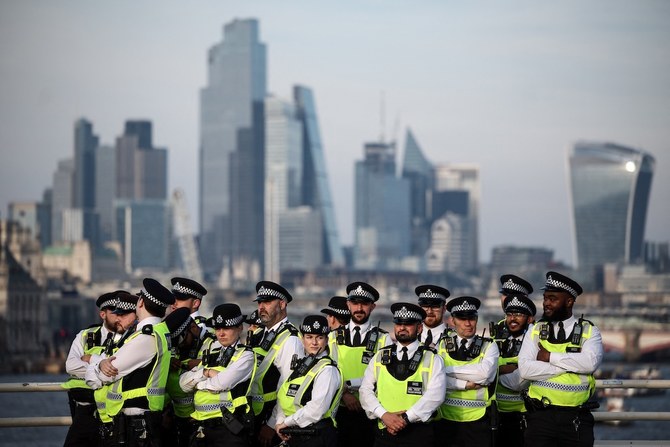
- Event to mark death of Iranian President Ebrahim Raisi descends into violence
- 4 injured, 1 arrested: Metropolitan Police
LONDON: Clashes in London between supporters and opponents of Iran’s government on Friday left four people with injuries, Sky News reported on Saturday.
One person was arrested on suspicion of violent disorder following the clashes.
Metropolitan Police officers were called to the scene at about 6 p.m. following reports of violence.
Pro-Tehran demonstrators had held an event to mark the death of President Ebrahim Raisi, who died in a helicopter crash last week.
Outside the venue, anti-Tehran protesters held a counter-demonstration, and clashes broke out between the two sides.
A Metropolitan Police spokesperson said four people were treated by paramedics for injuries. “Their injuries are not believed to be either life threatening or life changing,” the spokesperson added.
“Further inquiries will now follow to establish what further offences took place and to identify those involved.”
G7 says will try to use frozen Russian assets to help Ukraine
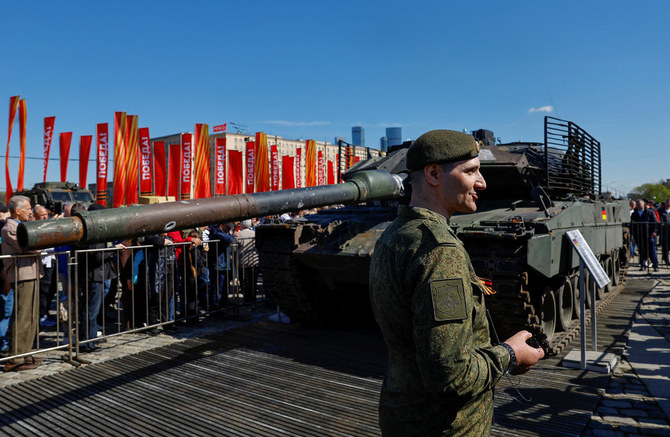
STRESA: The G7 will explore ways of using the future income from frozen Russian assets to help Ukraine, finance chiefs from the Group of Seven industrial democracies said on Saturday, according to a draft statement seen by Reuters.
The G7 froze some $300 billion of Russian assets shortly after Moscow invaded its neighbor in February 2022.
“We are making progress in our discussions on potential avenues to bring forward the extraordinary profits stemming from immobilized Russian sovereign assets to the benefit of Ukraine,” the draft statement said.
The statement will not undergo significant changes before a final version to be released later on Saturday, a G7 source said.
Millions vote in India’s grueling election with Modi’s party likely to win a third term
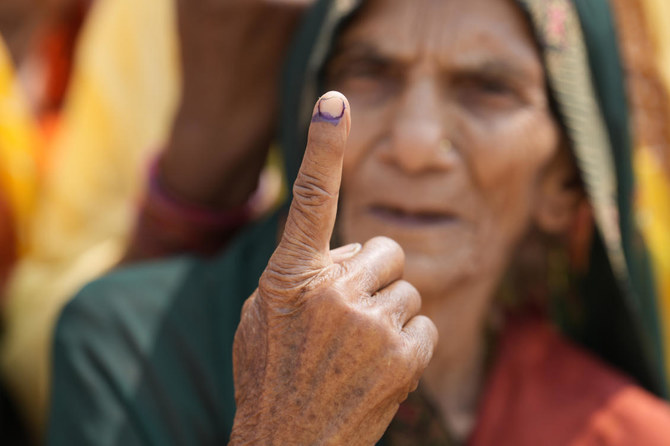
- Next-to-last phase of voting with temperatures forecast to surge to 47° Celsius in the capital New Delhi
- More than 111 million people in 58 constituencies across eight states and federal territories are eligible to vote
NEW DELHI: Millions of Indians are voting Saturday in the next-to-last round of a grueling national election with a combined opposition trying to rattle Prime Minister Narendra Modi’s campaign for a third-consecutive term for himself and his Hindu nationalist party.
Many people lined polling stations before the start of voting at 7 a.m. to avoid the blazing sun later in the day at the peak of Indian summer. The temperature soared to 43 Celsius (109.4 Fahrenheit) in the afternoon in the Indian capital.
Lakshmi Bansal, a housewife, said while the weather was hot, people usually went out to shop and even attend festivals is such heat.
“This (election) is also like a festival, so I don’t have a problem voting in the heat,” Bansal said.
Saturday’s voting in 58 constituencies, including seven in New Delhi, will complete polling for 89.5 percent of 543 seats in the lower house of Parliament.
The voting for the remaining 57 seats on June 1 will wrap up a six-week election. The votes will be counted on June 4.
President Droupadi Murmu and External Affairs Minister S. Jaishankar were among the early voters. Opposition Congress party leaders, Sonia Gandhi and her son Rahul Gandhi, also voted in New Delhi.
Mehbooba Mufti, a former top elected official of Indian-controlled Kashmir, held a protest with her supporters Saturday claiming that scores of her party workers were detained by the police to prevent them from voting. Mufti, the chief of the People’s Democratic Party who is contesting the parliamentary election in the Anantnag-Rajouri district, said she complained to election officials.
In West Bengal state, workers belonging to the All India Trinamool Congress party, blocked the car of Agnimitra Paul, one of Modi’s Bharatiya Janata Party candidates, as she proceeded to vote in Medinipur constituency. The two parties are rivals in the state and their workers often clash on the streets.
This election is considered one of the most consequential in India’s history and will test Modi’s political dominance. If Modi wins, he’ll be only the second Indian leader to retain power for a third term, after Jawaharlal Nehru, the country’s first prime minister.
A less-than-expected voter turnout in the previous five rounds of voting seems to have left both sides guessing about the outcome of the election.
Election authorities said they are taking steps to ensure voters’ comfort, such as setting up fans and tents and providing drinking water.
Most polls predict a win for Modi’s Hindu nationalist Bharatiya Janata Party, which is up against a broad opposition alliance led by the Indian National Congress and powerful regional parties.
Modi was involved in a highly acrimonious and mudslinging campaign with the opposition, led by Rahul Gandhi, the scion of the Nehru-Gandhi family that has produced three prime ministers.
“When the polls began it felt like a one-horse race, with Modi leading from the front. But now we are seeing some kind of shift,” political analyst Rasheed Kidwai said. “The opposition is doing better than expected and it appears that Modi’s party is rattled. That’s the reason you see Modi ramping up anti-Muslim rhetoric to polarize voters.”
Kidwai said the opposition has challenged Modi by centering its campaign narrative on social justice and rising unemployment, making the contest closer than expected.
Modi ran his campaign like a presidential race, a referendum on his 10 years of rule. He claimed to help the poorest with charity, free health care, providing toilets in their homes, and helping women get free or cheap cooking gas cylinders.
But he changed tack after a poor turnout of voters in the first round of the election and began stirring Hindu nationalism by accusing the Congress party of pandering to minority Muslims for votes.
Hindus account for 80 percent, and Muslims nearly 14 percent, of India’s over 1.4 billion people.
Manish Bhatia, a New Delhi voter, said that “politics on the basis of caste and religion is dangerous for the country,” adding that voting should be based on how candidates perform.
Nearly 970 million voters — more than 10 percent of the world’s population — were eligible to elect 543 members to the lower house of Parliament for five years.
Voters’ relative apathy has surprised some political analysts. In the five rounds of polling the voter turnout ranged between 62.2 percent to 69.16 percent — averaging 65.9 percent. By comparison, India’s 2019 national election registered the highest-ever voter turnout — 67.11 percent. Modi’s BJP won 303 seats in parliament in 2019.
Modi’s inauguration of a massive Hindu temple for the most revered Lord Rama, his massive roadshows, and big public rallies raised the BJP’s hopes of a massive a surge of voters in its favor.
The current prim minister came to power in 2014, dislodging the Congress party that governed the country for nearly 55 years after India won independence from British colonialists in 1947.
Before the election, the opposition INDIA alliance was seen bickering, but it has since held together, particularly after two chief ministers of two opposition-controlled states were sent to jail on corruption charges. Both deny the accusations.
One of them — New Delhi Chief Minister Arvind Kejriwal — has since been released on bail and returned to the campaign trail.
In March, Gandhi completed a 6,713-kilometer (4,171-mile) walk across the country, starting in the violence-hit northeastern state of Manipur, to raise awareness on issues of poverty, unemployment, and democracy with voters.
“The walk helped Gandhi boost his image as a serious politician among the voters, and that is helping the opposition,” Kidwai, the political anaylast, said.
India’s massive election faces heatwave challenge in penultimate phase
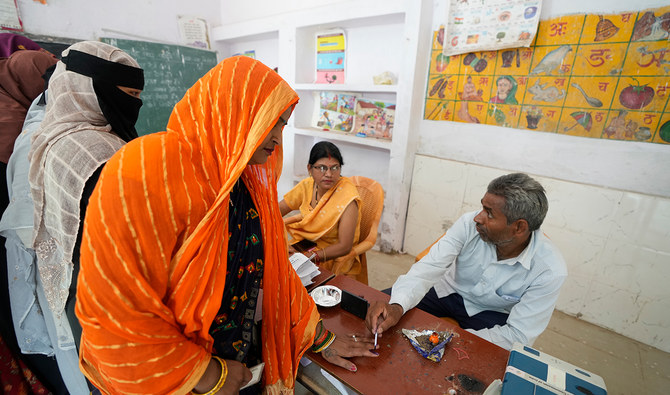
- The Election Commission has deployed paramedics with medicines and oral hydration salts at polling stations in Delhi
- In Haryana, people residing near polling booths pitched in to help voters, handing out cold drinks, dry fruits and milk
NEW DELHI: The world’s largest election may become the hottest on Saturday, as Indians participate in the next-to-last phase of voting with temperatures forecast to surge to 47 degrees Celsius (117 degrees Fahrenheit) in the capital New Delhi.
More than 111 million people in 58 constituencies across eight states and federal territories are eligible to vote in the general election’s sixth phase, which recorded a turnout of 10.82 percent in the first two hours of the 11-hour poll.
The overall turnout in the same phase of the last elections in 2019 was about 63 percent.
“There is a concern, but we hope that people will overcome the fear of the heatwave and come and vote,” Delhi Chief Electoral Officer P. Krishnamurthy told Reuters.
Voting in the elections began on April 19 and will conclude on June 1, with counting set for June 4.
Prime Minister Narendra Modi, leader of the Hindu-nationalist Bharatiya Janata Party (BJP), who is favored to win a third consecutive term, also asked people to “vote in large numbers” in a message on social media platform X on Saturday.
The Election Commission has deployed paramedics with medicines and oral hydration salts at polling stations in Delhi, which have additionally been equipped with mist machines, shaded waiting areas and cold water dispensers for voters.
In some parts of the northern state of Haryana, people residing near polling booths also pitched in to help voters beat the heat, handing out cold drinks, dry fruits and milk free of cost.
Among those who cast their ballot early in Delhi were Rahul Gandhi, leader of the main opposition Congress party and Modi’s main rival, his mother Sonia Gandhi and sister Priyanka Vadra.
“We are keeping all our grievances aside and casting our vote for our constitution and democracy,” Vadra told reporters.
Opposition leader and Delhi Chief Minister Arvind Kejriwal, whose bail after pre-trial detention of nearly two months in a graft case has given fresh impetus to the opposition campaign, also voted in the capital.
Price rise and unemployment were two of the major issues mentioned by voters to Reuters when asked about the factors that determined their ballot.
“The government boasts about fast economic growth but the reality on the ground is very different,” said Delhi voter Fazal, 46, who only gave his first name and works at a multinational corporation, adding he also voted to “save democracy.”
Ashok Ghana, a plumber in the eastern state of Odisha, who said he voted for the BJP, added that “price rise and the non-availability of jobs” were the issues he considered.
Among those who voted based on the situation in their region was property dealer Praveen Chauhan, 43, in Delhi.
“My main issues are clean water, electricity, access to good health care and education,” he said, adding that the Kejriwal-led Delhi government “has given us that till now.”
While the heatwave was a concern in Delhi, a cyclone that is expected to hit land tomorrow was being closely watched in eastern Odisha and West Bengal, parts of which are also voting on Saturday.
Taiwan calls China’s military drills a ‘blatant provocation’ to world order
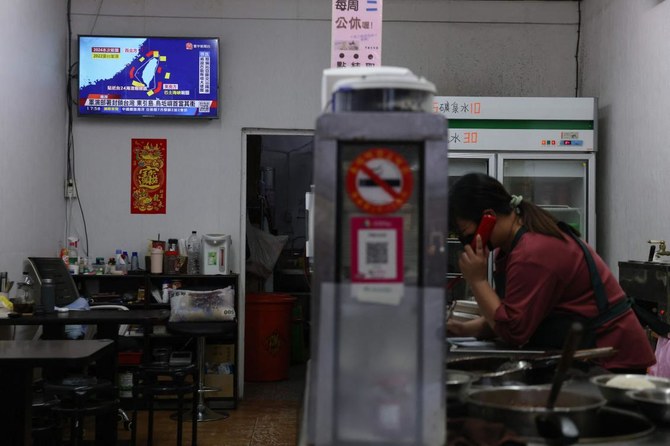
- The drills were launched three days after Taiwan’s President Lai Ching-te took office
- Exercises involved simulating strikes targeting the island’s leaders as well as its ports and airports
TAIPEI: China’s two-day military drills around Taiwan were a “blatant provocation to the international order,” Taipei said in a statement Saturday after the war games encircling the self-ruled island ended.
The drills were launched three days after Taiwan’s President Lai Ching-te took office and made an inauguration speech that China denounced as a “confession of independence.”
China, which claims Taiwan as part of its territory, regards Lai as a “dangerous separatist.”
By Friday evening, a presenter for state-run military news channel CCTV-7 said the Chinese army had “successfully completed” the operation dubbed “Joint Sword-2024A.”
In a statement, Lai’s presidential spokesperson Karen Kuo reiterated that ensuring peace and stability across the region was “related to the common interests of the international community.”
“However, China’s recent unilateral provocation not only undermines the status quo of peace and stability in the Taiwan Strait but it is also a blatant provocation to the international order, triggering serious concern and condemnation from the international community,” she said.
Kuo added that Taiwan hopes “China will take the safety and happiness of the people on both sides into consideration, pursue mutual benefit, coexistence... stop all kinds of political and military intimidations on Taiwan and the region.”
Self-ruled Taiwan has its own democratically elected government, military and currency, but Beijing has said it would never renounce the potential use of force to bring the island under its control.
Chinese military analysts told state news agency Xinhua that the People’s Liberation Army vessels had inched “closer than ever before” to Taiwan’s shores during the two-day military drills.
The exercises involved simulating strikes targeting the island’s leaders as well as its ports and airports, they said.
In regards to China’s various military actions, Kuo said that “the president and the national security team have a full grasp of the situation” and called for the public to “rest assured.”


